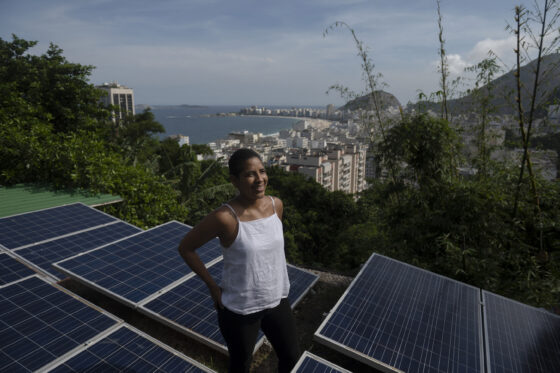
In Babilonia, a favela on a hill with a beautiful view of Copacabana Beach in Rio de Janeiro, an image clashes between corrugated iron roofs: photovoltaic panels to relieve electricity bills.
“Some residents have to choose between paying these bills or buying food”, laments Stefano Motta, president of the first solar energy cooperative in a favela in Brazil. This cooperative has installed 60 panels on the roof of the building of a neighborhood association to provide 34 families with energy.
The production is connected to the local electricity grid and the distributor takes this contribution from solar energy into account in order to reduce the amount of invoices, with a variable rate according to production. Result: half the electricity price for Marcia Campos, a 51-year-old social worker, beneficiary of this project set up in July 2021 by several associations, in collaboration with the NGO Revolusolar.
Previously, his bill was 500 reais per month (about 95 euros), almost half the minimum wage in Brazil. “Today I pay about 260 reais, and I even had months on 180 reais” during the sunniest periods“, she explains.
In total, the favela has 104 photovoltaic panels, with four installations, one of which is on the roof of the hostel of Colombian Bibiana Angel Gonzalez. “We used to spend a large part of our meager turnover on paying for electricity”she says.
“We had quotes for panels, it was too expensive. But by collaborating with others, thanks to the cooperative, we have managed to reduce transport costs”she adds.
“Fast growth”
“Residents are increasingly complaining about the price of electricity bills and we show them that solar energy is important for the environment, but also for saving money”, explains Stefano Motta, a 45-year-old Italian from Sicily who has lived in Brazil for ten years. He lives in Chapeu Mangueira, the neighboring favela of Babilonia.
André Luiz Campos, a 49-year-old receptionist, is not yet a member of the cooperative and has seen his bills skyrocket in recent months. “I just have a fridge, a freezer and a TV and pay 800 reais (150 euros) per month. How is it possible?”he wonders.
The electricity price in Brazil has increased by an average of 7% in 2021 compared to 2020, an increase that should accelerate sharply this year to 21% according to the latest forecasts. Rates have risen in particular because of the historic drought that hit Brazil last year, in a country where 57.6% of energy is supplied by hydroelectric power plants.
According to the Brazilian Solar Energy Association (Absolar), the share of solar photovoltaics in the national electricity production is only 1.8% in this tropical, sun-drenched country.
But it is “a sustainable alternative to lower the price of bills for poor populations”, assures Carlos Aparecido, electrical specialist at the Federal University of Rio de Janeiro (UFRJ). Especially as the sector is experiencing “rapid growth”, with a 29.3% increase in installed capacity in 2021.
“A necessity”
He also estimates that installing photovoltaic panels in the favelas could reduce the number of illegal connections to the grid, which accounts for 1.5 billion reais (about 300 million euros) in losses per year in the country, according to an industry association.
According to him, distributors “let consumers foot the bill” to offset these losses. Stefano Motta hopes the success of Babilonia’s project will be replicated in Rio, which has 763 favelas home to nearly 1.4 million people, about a quarter of the city’s population.
The first to follow suit is Elma de Aleluia, founder of the NGO SER Alzira, in the favela of Vidigal, near the chic Leblon district. It installed photovoltaic panels last December, thanks to corporate donations. “It was a necessity. Thanks to these savings, we have more resources to invest in our projects” socio-educational, explains the associative activist.
AFP